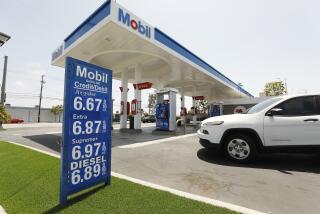Gasoline prices not expected to slacken
- Share via
Pump prices will remain high this summer because gasoline supplies will be slim throughout the busy driving season, even though motor fuel imports have recently soared, the government’s top energy forecaster told Congress on Thursday.
“Gasoline inventories are expected to remain tight throughout the summer, which will keep pressure on gasoline prices and likely result in higher margins and retail prices than those seen last summer,” Guy Caruso, head of the Energy Information Administration, testified at a Senate hearing on the effects of high gasoline costs on businesses.
Gasoline imports have soared recently, reaching more than 1.6 million barrels a day during the third week of May and more than 1.5 million barrels a day the following week, and will help to build inventories, Caruso said.
The nation’s gasoline supply has been affected more than usual by refinery outages, Caruso told the Senate Small Business Committee. Refineries are operating at less than 90% capacity, the lowest level for this time of year in 15 years.
Caruso said the problem facing refiners is unplanned outages, not routine maintenance. He said refiners would not purposely go offline to limit gasoline supplies, because they would lose sales.
“We certainly have not seen there was any attempt [by refiners] to manipulate the market,” Caruso said.
Caruso said that refining capacity should rise in the next several months and that gasoline supplies would be adequate to meet summer demand.
The information agency, the statistical arm of the Department of Energy, is forecasting the national price for regular gasoline will average $3.05 a gallon during the summer driving season, up 21 cents from last summer.
High fuel prices are not only pinching the pocketbooks of consumers, but are also hurting trucking companies.
The U.S. trucking industry will spend a record $106 billion on fuel this year, up $3 billion from last year and more than double the fuel bill in 2003, Timothy Lynch, senior vice president of the American Trucking Assns., told the committee.
“The sharp increase in the cost of diesel fuel is a hardship for small trucking companies,” Lynch said. He also said new federal environmental requirements for cleaner engines and low-sulfur diesel have lowered the fuel economy of big trucks to about 5 miles per gallon.
More to Read
Inside the business of entertainment
The Wide Shot brings you news, analysis and insights on everything from streaming wars to production — and what it all means for the future.
You may occasionally receive promotional content from the Los Angeles Times.










